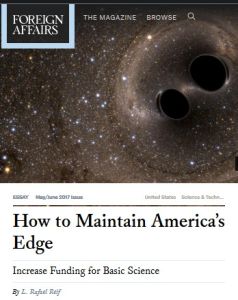Join getAbstract to access the summary!

Join getAbstract to access the summary!
L. Rafael Reif
How to Maintain America’s Edge
Increase Funding for Basic Science
Foreign Affairs, 2017
What's inside?
Federal funding for basic science energizes the economy, but the US government is busy cutting its budget.
Recommendation
What do GPS, MRI, various cancer treatments and the technologies that drive the Internet have in common? Each emerged from unguided scientific inquiry, funded not by investors greedy for results or even by philanthropic billionaires, but by the US government. Massachusetts Institute of Technology president L. Rafael Reif wishes to remind readers of this and to call attention to how investments in basic science drive the US economy by creating financial and national security. getAbstract recommends this thoughtful essay to policy makers and citizens who want to understand why they should cast their vote for science.
Summary
About the Author
L. Rafael Reif is an electrical engineer, a writer and the president of the Massachusetts Institute of Technology.

















Comment on this summary